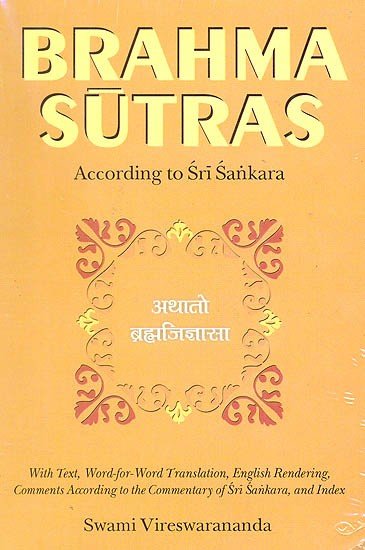Brahma Sutras (Shankara Bhashya)
by Swami Vireshwarananda | 1936 | 124,571 words | ISBN-10: 8175050063
This is the English translation of the Brahma-sutras including the commentary (Bhashya) of Shankara. The Brahma-sutra (or, Vedanta-sutra) is one of the three canonical texts of the Vedanta school of Hindu philosophy and represents an early exposition the Vedantic interpretation of the Upanishads. This edition has the original Sanskrit text, the r...
Chapter II, Section I, Adhikarana XII
Adhikarana summary: Partiality and, cruelty cannot be attributed to Brahman
Sutra 2,1.34
वैषम्यनैर्घृण्ये न, सापेक्षत्वात्,
तथा हि दर्शयति ॥ ३४ ॥
vaiṣamyanairghṛṇye na, sāpekṣatvāt,
tathā hi darśayati || 34 ||
aiṣamyanairghṛṇye—Partiality and cruelty; na—not; sāpekṣatvāt—on account of Its taking into consideration (other reasons); tathā—so; hi—because; darśayati—declares.
34. Partiality and cruelty cannot (be attributed to Brahman) on account of Its taking into consideration (other reasons in that matter), because (the scripture) declares (it to be) so.
Some are created poor, some rich; hence the Lord is partial to some. He is cruel, inasmuch as He makes people suffer. To such an objection this Sutra replies that the Lord cannot be accused of partiality and cruelty, because He dispenses according to the merit and demerit of the individual soul. The scripture declares to that effect, “A man becomes good by good work, bad by bad work” (Brih. 3. 2. 18). But this does not contradict the independence of the Lord, even as the king’s status is not compromised by his giving presents to his servants according to their action. Just as rain helps different seeds to sprout, each according to its nature, so God is the general efficient cause in bringing the latent tendencies of each individual to fruition. Hence he is neither partial nor cruel.
Brahma-Sutra 2.1.35: Sanskrit text and English translation.
न कर्माविभागादिति चेत्, न, अनादित्वात् ॥ ३५ ॥
na karmāvibhāgāditi cet, na, anāditvāt || 35 ||
na—not; karmāvibhāgāt—for want of distinction in work; iti cet—if it be said; na—no; anāditvāt—because of (the world) being without a beginning.
35. If it be said (that is) not (possible) for want of any distinction in work (before creation), (we say) no, because of (the world) being without a beginning.
Since before the first creation the individual soul cannot possibly have had a previous existence, whence comes the difference in the condition of beings in that first creation, unless the Lord has caused it out of His partiality? This objection is answered by the Sutra, which says that creation is without a beginning and the question of first creation cannot arise. It is like a seed and its sprout. So the individual souls have always had a previous existence aöd done good or bad deeds in accordance with which their lot in a subsequent creation is ordained by the Lord.
Brahma-Sutra 2.1.36: Sanskrit text and English translation.
उपपद्यते चाप्युपलभ्यते च ॥ ३६ ॥
upapadyate cāpyupalabhyate ca || 36 ||
upapadyate—Is reasonable; ca—and; api—and; upalabhyate—is seen; ca—also.
36. And (that the world is without a beginning) is reasonable and is also seen (from the scriptures).
Reason tells us that creation must be without a beginning. For if the world did not exist in a potential state in the form of Samskaras (impressions), then an absolutely non-existing thing would be produced at creation. In that case even liberated souls might be reborn. Moreover people would be enjoying or suffering without having done anything to deserve it—an instance of an effect without a cause, which is absurd. It cannot be attributed to primeval ignorance, which, being one, requires the diversity of individual past work to produce varied results. The scriptures also posit the existence of the world in former cycles in texts like “The Lord devised the sun and moon as before” (Rig-Veda 10. 190. 3).
So partiality and cruelty cannot be imputed to the Lord.
